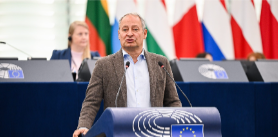The 2025 European Parliament report on Albania marks a significant moment in the country’s EU integration path — not only for its content, but also for the starkly
divergent narratives it has generated between pro-government actors and the opposition. While formally an annual exercise in progress evaluation, this year`s report has evolved into a prism through which competing visions of Albania’s democratic credentials are refracted.
The Committee on Foreign Affairs (AFET) identified mixed progress. On one hand, Albania was credited for:
- Administrative modernization
- Advancements in digital governance
- Constructive alignment with EU foreign policy
Yet, the report also expressed “deep concern“ over:
- The lack of transparency in implementing the Strategic Investment Law
- Persistent issues with judicial independence and anti-corruption enforcement
- Shrinking media freedom and alleged pressures on civil society
The report stopped short of recommending the suspension of negotiations, but it subtly warned that democratic standards must be “substantially reinforced” for the accession process to maintain credibility.
From Brussels, former Prime Minister and Democratic Party leader Sali Berisha framed the report as a “crystal-clear condemnation” of the Rama government. He focused especially on the denunciation of the Strategic Investment Law, which he labelled a “legal façade for clientelist capture.” Berisha argued that the report validates years of opposition claims that the current administration is steering the country away from EU democratic norms. “This is not just an evaluation — it is a damning stigma on a regime that tramples fundamental rights,” Berisha declared.
In contrast, officials from the Rama administration emphasized the report’s positive elements — particularly acknowledgments of macroeconomic stability, digital reforms, and Albania’s alignment with the EU’s Common Foreign and Security Policy. They downplayed criticisms as “constructive recommendations” rather than indictments. “This report reflects our ongoing transformation,” said a government spokesperson, Elisa Spiropali. “We welcome critical input that helps us align faster with EU standards.”
Compared to North Macedonia, which has also faced internal political polarization
and reform delays, Albania’s report is arguably more critical on issues of rule of law and transparency. Montenegro, long viewed as the front-runner, has received stronger praise in its report, despite recent political instability. What sets Albania apart is the intensity of the domestic political divide over EU-related assessments. In countries like Serbia and Montenegro, EU reports tend to trigger technocratic responses. In Albania, they spark political theatre.
The EU’s explicit mention of the Strategic Investment Law as problematic is politically symbolic. While promoted by the government as a catalyst for foreign investment, it is increasingly viewed in Brussels as a mechanism prone to abuse — granting discretionary powers without adequate public scrutiny. In the European institutional lexicon, criticism of such laws often implies a concern with state capture — a coded but serious accusation.
The report does not derail Albania’s EU aspirations. However, it injects new urgency into reform implementation, particularly in judicial vetting, anti-corruption efforts, and restoring checks and balances. What’s clear is that Brussels is watching closely — not only the metrics, but the political climate in which those metrics evolve. The 2025 report functions as both a mirror and a test. It reflects Albania’s progress, yes — but also magnifies its institutional fragilities. Whether the country’s political class will treat this moment as a turning point or another round of blame-shifting remains to be seen.
Written by our correspondent A.T.



